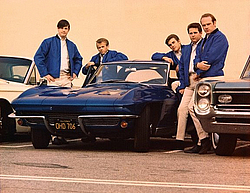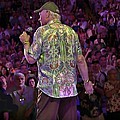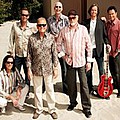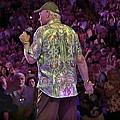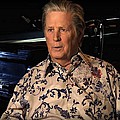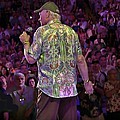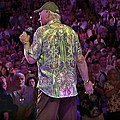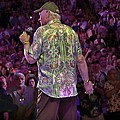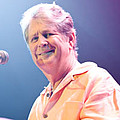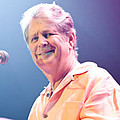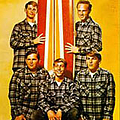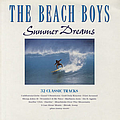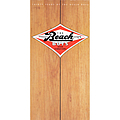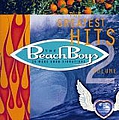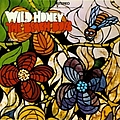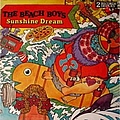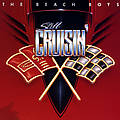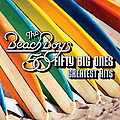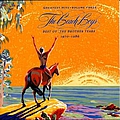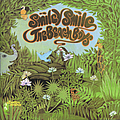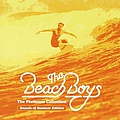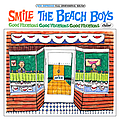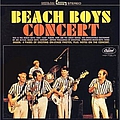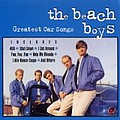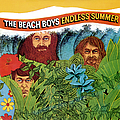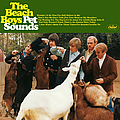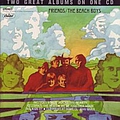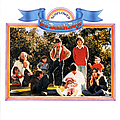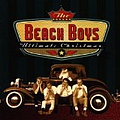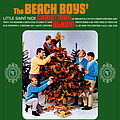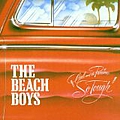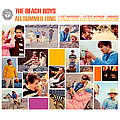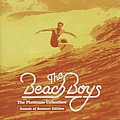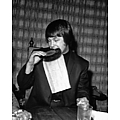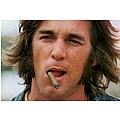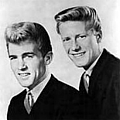The Beach Boys Biography
The Beach Boys are an iconic american pop and rock music group formed in Hawthorne, California in 1961, who are widely considered to be one of the most influential bands in rock and pop music history. They have recorded dozens of Top 40 hits (including four US #1 singles), many best-selling albums, and were inducted into the Rock and Roll Hall of Fame in 1988. The original group comprised singer-musician-composer Brian Wilson, his brothers Carl Wilson and Dennis Wilson, their cousin Mike Love, friend Al Jardine, and David Marks. Many changes in both musical style and personnel have occurred in their sometimes-stormy career: Brian Wilson's mental illness, drug addiction and eventual withdrawal from the group; the deaths of Dennis Wilson in 1983 and Carl Wilson in 1998; and continuing legal battles among surviving members of the group. The Beach Boys officially broke up in 1998 shortly after Carl Wilson's death, however Mike Love and Bruce Johnston maintain the rights to the name and continue to tour with their own band as The Beach Boys. ===History=== ==Early years== The group was formed in 1961 in Hawthorne, California under the leadership of Brian Wilson, and included his brothers Carl and Dennis, their cousin Mike Love and school friend Al Jardine. The early inspirations of the group were the Wilsons' musician father, Murry, and the close vocal harmonies of groups such as The Four Freshmen. The group performed initially as The Pendletones, after the Pendleton woolen shirts popular then. Although surfing motifs were very prominent in their early songs, Dennis was the sole actual surfer in the group. He suggested to his brothers that they do some songs celebrating his hobby and the lifestyle which had developed around it in Southern California. At first Murry Wilson, by many accounts a hard-driving man, steered The Beach Boys' career, engineering their signing with Capitol Records in 1962. In 1964 Brian Wilson fired his father after a violent confrontation in the studio. Over the next few years they became increasingly estranged; when Murry died some years later, Brian and Dennis did not attend the funeral. The Beach Boys' early material focused on the California youth lifestyle (e.g., "All Summer Long", "Fun, Fun, Fun"), cars ("Little Deuce Coupe") and of course surfing ("Surfin' U.S.A.", "Surfin' Safari" and many others). Although their music was bright and accessible, these early works contained remarkably sophisticated musical ideas. During this period, Brian Wilson rapidly progressed to become a melodist, arranger, and producer of world-renowned stature. Their early hits made them major pop stars in America and other countries, although their status as America's top pop group was challenged in 1964 by the emergence of The Beatles, who became The Beach Boys' major creative rival. Like The Beatles, the Beach Boys showed very fast development during the mid-'60s, drawing upon the innovations of songwriters and producers such as Burt Bacharach and especially Phil Spector. They produced the enduring classic "California Girls" in 1965, a banner year for popular music which also saw similarly advanced singles by The Beatles, The Rolling Stones, The Byrds, and James Brown. But it was the Beach Boys' role to create a myth of American freedom and dreams of adolescence, and increasingly, to articulate a dread of what lay after adolescence. ==Brian's innovations and personal difficulties== During 1964 Brian Wilson began to suffer from anxiety attacks, and withdrew from touring to concentrate on song writing and record production. Glen Campbell served as Wilson's replacement on tours, until his own career success required him to leave the group. Bruce Johnston was asked to locate a replacement for Campbell; having failed to find one, Johnston subsequently became a full-time member of the band, first replacing Wilson on the road, and then contributing his talents in the studio. Wilson's growing mastery of the recording studio and his increasingly sophisticated songs and complex arrangements reached an early peak with the acclaimed LP Pet Sounds (1966). Classic singles from that album, "Wouldn't It Be Nice" and "God Only Knows" showed Wilson's growing skill as a composer, arranger and producer. "God Only Knows" is said to have been the first pop single ever released in the U.S. to have the word "God" in the title (because of which many radio stations in the U.S. refused to play it.) "Caroline, No" also taken from Pet Sounds, was issued as a Brian Wilson solo single, the only time Brian was credited as a solo artist during the early Capitol years. The album's meticulously layered harmonies and inventive instrumentation (performed by the cream of Los Angeles session musicians known as The Wrecking Crew) set a new standard for popular music. It remains one of the more evocative releases of the decade, with a distinctive strain of melancholy and nostalgia for youth. The album is still widely regarded as a classic and Paul McCartney has named it one of his favorite albums of all time, (with "God Only Knows" as his favorite song) often saying that it was a major influence on The Beatles' album, Sgt. Pepper's Lonely Hearts Club Band. Despite the critical praise it received, the album was poorly promoted by Capitol Records and failed to become the major hit Brian had hoped it would be (only reaching #10). Its failure to gain wide recognition hurt him deeply. Because of his withdrawal from touring, Wilson was able to complete almost all the backing for the album while the Beach Boys were on tour in Japan. They returned to find a substantially complete album, requiring only their vocals to finish it off. There was some resistance from within the band to this new direction. Lead singer Mike Love is reported to have been strongly opposed to it, partly because he feared the band would lose its audience if they changed their successful formula, and partly because he personally disliked the new material, which he famously criticized as "Brian's ego music." At Love's insistence, Brian changed the title of one song from "Hang on to Your Ego" to "I Know There's an Answer". Another likely factor in Love's antipathy to Pet Sounds was that Wilson worked extensively on it with outside lyricist Tony Asher rather than with Love, even though Love had co-written the lyrics for many of their earlier songs and was the lead vocalist on most of their early hits. It should also be stated that Love, as recently as February 2008 in a top British music magazine, denies emphatically that he was opposed to Brian's new directions. Quite the contrary, contributing the lyrics to the classic form of Good Vibrations which certainly seemed to usher in flower power. He really is tired of this view of him as being Brian's nemesis. He could see Brian was destroying himself and that was what he feared. Seeking to expand on the advances made on Pet Sounds, Wilson began an even more ambitious project, originally dubbed Dumb Angel. Its first fruit was "Good Vibrations," which Brian described as "a pocket symphony". The song became the Beach Boys' biggest hit to date, and a US and UK # 1 single in 1966 — many critics consider it to be one of the best rock singles of all time. In 1997 it was named the "Greatest Single of All Time" by Mojo music magazine, in 2000, VH1 placed it at number 8 on their "100 Greatest Rock Songs" list, and in late 2004 Rolling Stone magazine placed it at number 6 on their "500 Best Songs of All Time" list. It was also one of the more complex pop productions ever undertaken, and was reputed to have been the most expensive American single ever recorded, costing a reported $16,000 -- more than most pop albums of that time -- with sessions stretching over several months in at least three major studios. In contrast to his work on Pet Sounds, Wilson adopted a modular approach to "Good Vibrations" — he broke the song into sections and taped multiple versions of each at different studios to take advantage of the different sound of each facility. He then assembled his favorite sections into a master backing track and added vocals. The song's innovative instrumentation included drums, organ, piano, tack piano, two basses, guitars, electro-theremin, harmonica, and cello. The group members recall the "Good Vibrations" vocal sessions as among the most demanding of their career. Even as his personal life deteriorated, Wilson's musical output remained remarkable. The exact nature of his problems was a topic of much speculation. He abused drugs heavily, gained an enormous amount of weight, suffered long bouts of depression, and became paranoid. Several biographies have suggested that his father may have had bipolar disorder, and after years of suffering, Wilson's own condition was eventually diagnosed as schizophrenia. ==The story behind "Smile"== Shortly after completing "Good Vibrations," Wilson met session musician and songwriter Van Dyke Parks, and in late 1966 they began an intense collaboration that resulted in a suite of superb new songs for the Beach Boys' next album, which was originally going to be titled Dumb Angel but was renamed Smile. Using the same methods as on "Good Vibrations," recording began in late 1966 and carried on into early 1967. Although the structure of the album and the exact running order of the songs have been subjects of endless speculation, it is apparent that Wilson and Parks intended Smile to be a continuous suite of songs that were linked both thematically and musically, with the main songs being linked together by small vocal pieces and instrumental segments that elaborated the musical themes of the major songs. But some of the other Beach Boys — especially Love — found the new music too difficult and too far removed from their established style; another serious concern was that the new music was simply not feasible for live performance by the current Beach Boys lineup. Love was bitterly opposed to Smile and was particularly critical of Parks' lyrics; he has also since stated that he was becoming deeply concerned about Wilson's escalating drug intake. The problems came to a head during the recording of "Cabinessence," when Love demanded that Parks explain the meaning of the closing refrain of the song, "Over and over the crow cries uncover the cornfield." After a heated argument, Parks walked out and his partnership with Wilson came to an abrupt end. Many factors combined to focus intense pressure on Wilson as Smile neared completion, including mental instability, the pressure to perform against fierce opposition to his new music, the relatively poor response to Pet Sounds, Carl Wilson's draft resistance, and a major dispute with Capitol. Matters were complicated by his reliance on both prescription and illegal drugs, particularly marijuana and amphetamines, which only exacerbated his underlying mental health problems. Just weeks before The Beatles' Sgt. Pepper's Lonely Hearts Club Band was released, Smile was shelved. Over the next 30 years the legends surrounding Smile grew, until it became the most famous unreleased album in the history of popular music. Some of the tracks were salvaged and rerecorded at Brian's new home studio in drastically scaled-down versions. These were released, along with the completed versions of "Good Vibrations" and "Heroes and Villains", on the 1967 LP Smiley Smile, which would prove to be a critical and commercial disaster for the group. Despite the cancellation of Smile, interest in the work remained high and versions of several major tracks — including "Our Prayer", "Cabinessence", "Cool, Cool Water", and "Surf's Up" — were assembled by Carl Wilson over the next few years and included on later albums. The band was expecting to complete and release Smile even until 1972, when it became clear that only Brian would ever be able to make sense out of the endless fragments that were recorded. A substantial number of original tracks and linking fragments were included on the group's 30th anniversary CD boxed set in 1993. Smile itself, in its original conception, did not surface until Wilson and Parks completed the writing and Brian rerecorded it as a solo project in 2004. ==Mid-career brings changes== Following their peak popularity with the song Good Vibrations was a period of declining commercial success, with Smiley Smile and subsequent albums doing poorly on the US charts (although they fared better in the UK). Their image problems were not helped by the criticism that followed their withdrawal from the bill of the 1967 Monterey International Pop Festival as a result of Carl's draft problems, an event that would undoubtedly have been crucial in establishing their new sound had they been able to present their new material there. The 1967 album Wild Honey, regarded by many critics as a classic, features exuberant upbeat songs written by Brian and Mike, including the hit "Darlin'", and a cover of Stevie Wonder's "I Was Made to Love Her". Friends (1968) is a quiet, tuneful, and largely acoustic album, influenced by the group's adoption of the practice of Transcendental Meditation. The title single, however, backed by Dennis' songwriting debut Little Bird, was their least successful since 1962. This was followed by the single "Do It Again", a return to their earlier "fun in the sun" style, which was moderately successful in the US, but went to #1 in the UK. As Brian's health deteriorated in the late 1960s and early 1970s, his song output diminished and he became increasingly withdrawn from the group. To fill the void, the other members of the group began writing songs, and Carl gradually took over leadership of the band, developing into an accomplished producer. To complete their contract with Capitol Records before signing with Reprise, they produced one more album, 20/20 (1969), primarily a collection of leftovers (including some from "Smile"), cover songs, and several new songs by Dennis. One of Denny's songs, "Never Learn Not to Love", featured lyrics by Charles Manson originally titled "Cease to Exist". Besides "Do It Again", the album included their cover of The Ronettes' "I Can Hear Music", their last top 40 hit for seven years. Their first two Reprise LPs were Sunflower (1970) and 1971's Surf's Up, featuring new songs by Brian and all the group members, plus selections from the aborted "Smile" project. According to the liner notes for the 2004 version of Smile, Reprise expected the legendary album to be completed and released as part of the new contract, but this was never to be; however, these albums included some of their most evolved and complex music since the "Smile" period. The addition of Ricky Fataar and Blondie Chaplin in 1972 led to a dramatic departure in sound for the band. Carl and the Passions - So Tough was an uncharacteristic mix including several songs unrecognizable as the Beach Boys. Although it includes the classic "Marcella", many consider the album among their poorest efforts. Continuing with
Top The Beach Boys Lyrics
| Title | |
|---|---|
| 1 | Trader lyrics |
| 2 | Shut Down lyrics |
| 3 | California Dreamin' lyrics |
| 4 | Darlin' lyrics |
| 5 | Kokomo lyrics |
| 6 | Wouldn't It Be Nice lyrics |
| 7 | God Only Knows lyrics |
| 8 | Good Vibrations lyrics |
| 9 | 409 lyrics |
| 10 | Wild Honey lyrics |
Write a comment
What do you think about The Beach Boys? Let us know in the comments below!
The Beach Boys News & events
Top The Beach Boys Albums
Similar artists
- Brian Wilson60s/Pop/Rock
- Dennis WilsonPop/Rock
- Jan & Dean60s
- The Byrds60s/Folk/Rock
- The Zombies60s/Pop/Rock
- The Association60s/Pop
- The Crystals60s/Pop/Soul
- The Ronettes60s/Pop/Soul
